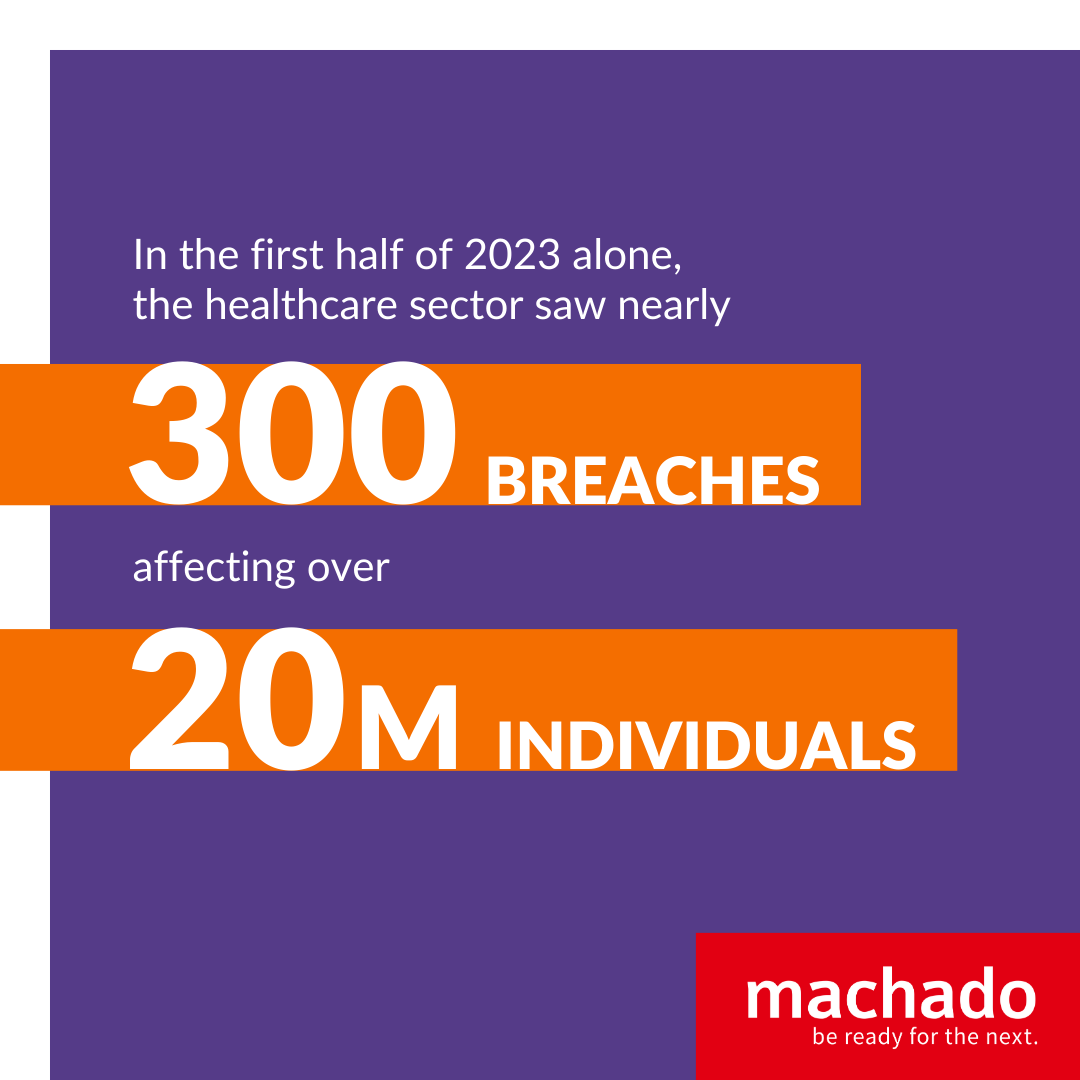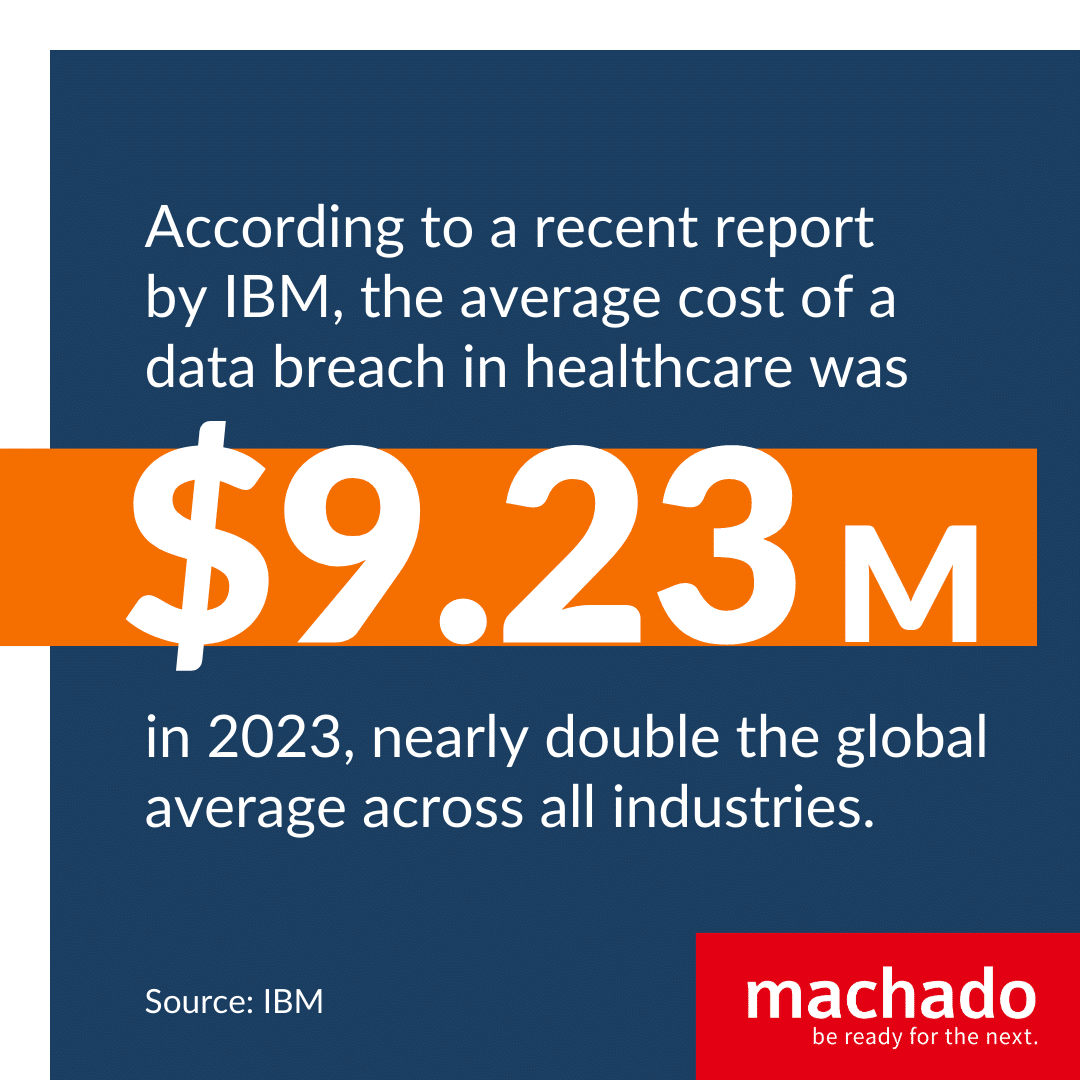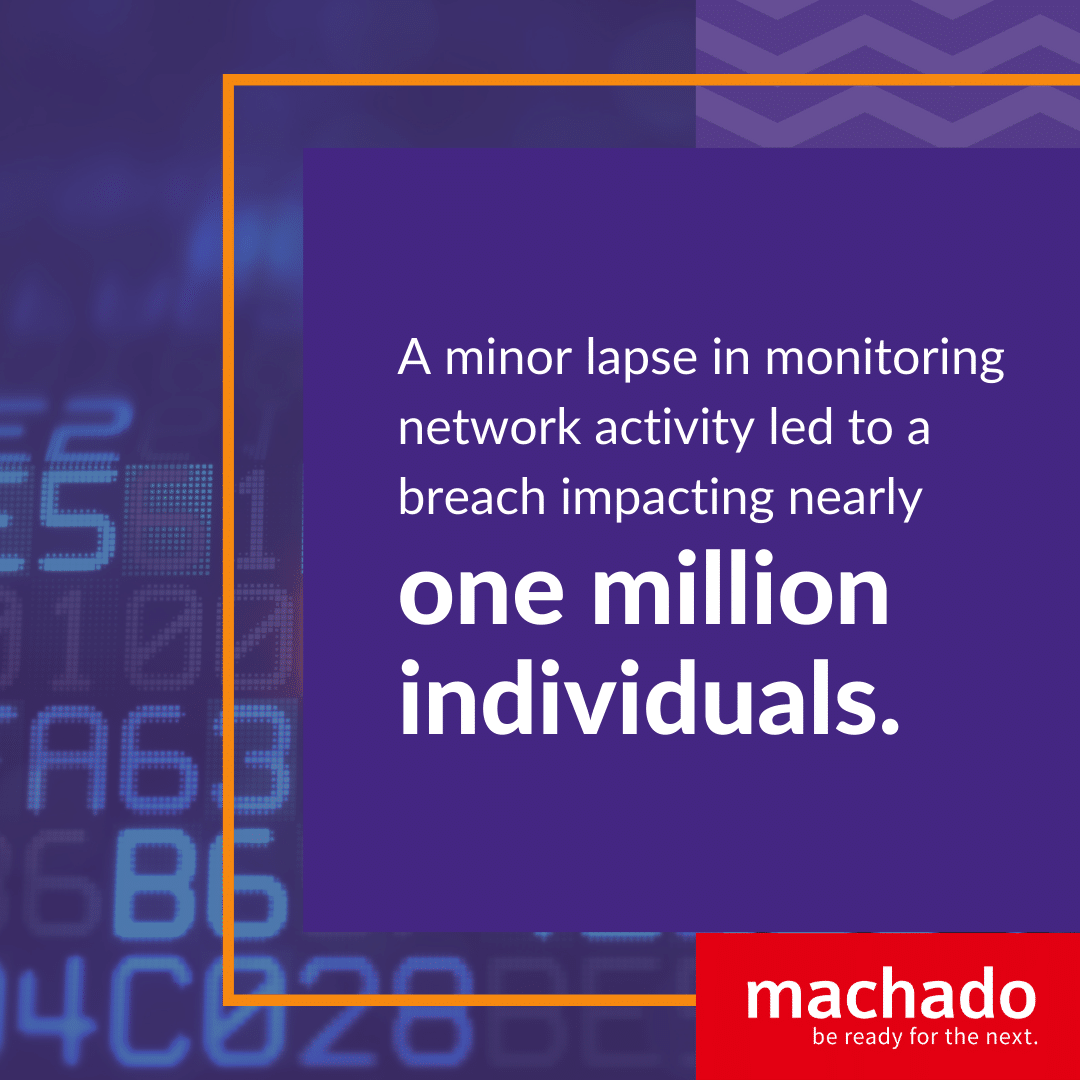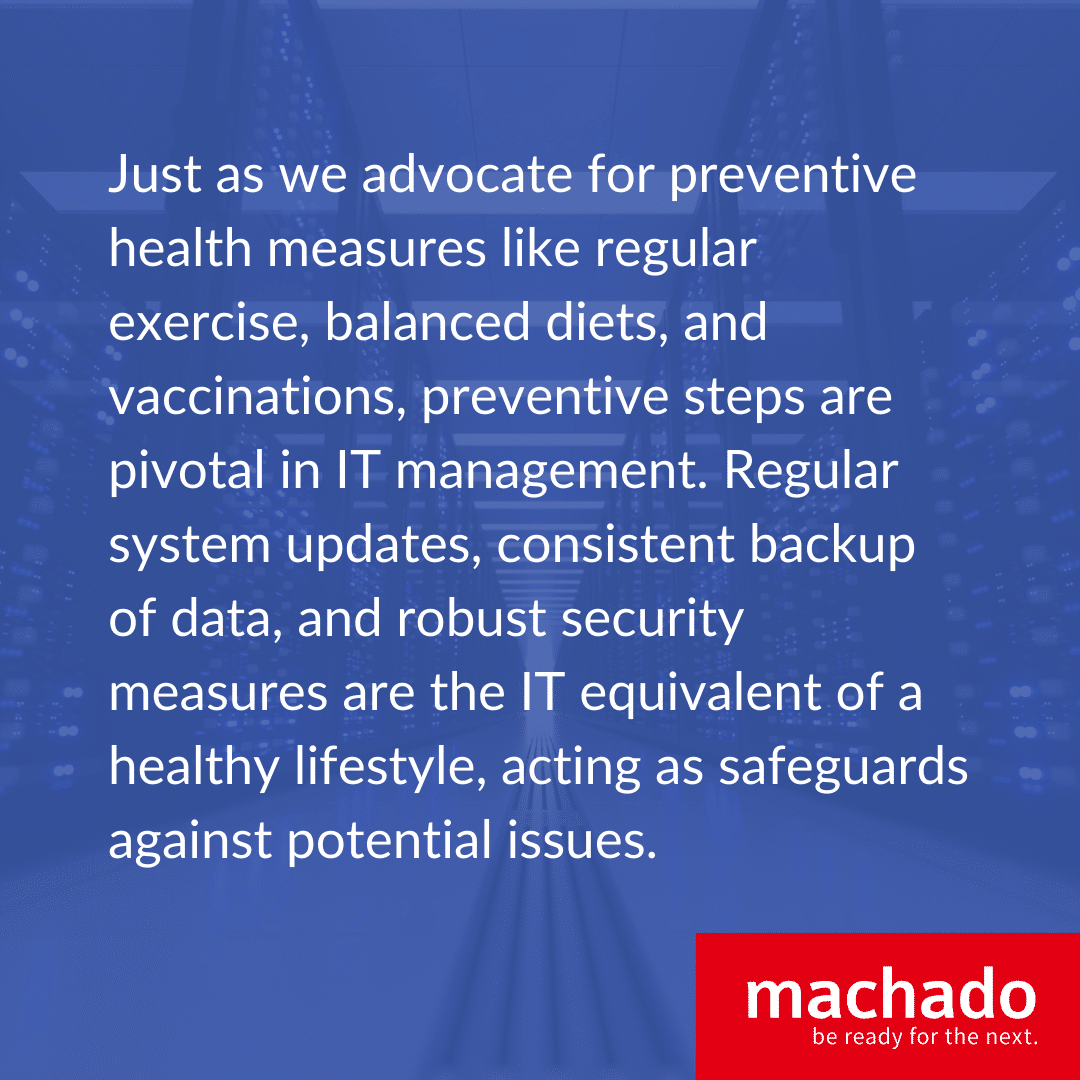TL;DR: Proactive IT management in healthcare is similar to proactive patient care practices. This article covers challenges to IT systems in small healthcare practices, outlines potential risks such as threats to data security, inefficiencies, and HIPAA violations, and introduces proactive IT management as the solution.
Technology has sped up our lives and brought many improvements, including making things more efficient and easier to manage. One of the areas where this impact is felt strongly is healthcare, where people’s lives often depend on it. However, just like these tech advancements are changing everything, healthcare has also seen an increase in challenges, especially when it comes to digital security.
Some people working in healthcare may not think that tech and cybersecurity are important. But, according to the HHS Office for Civil Rights (OCR), there were about 295 data breaches in the healthcare sector in just the first half of 2023.
This leads to an important comparison. In the same way that preventative care is important in health, proactive tech management is just as vital for the digital parts of our healthcare systems. It’s like using preventative medicine but for our tech systems in healthcare. We need to protect our healthcare systems with preventative digital care.
In this article we look at how our healthcare systems can benefit from a dose of preventive tech care.
The Common Cold of Tech: Mismanagement
Much like the common cold, the first signs of IT mismanagement can seem benign, almost imperceptible. Maybe it’s the occasional system glitch, or a delay in software updates. Perhaps it’s an ill-prepared response to a minor data breach. These might seem like small annoyances, even tolerable in the hustle and bustle of running a healthcare practice, particularly a small one.
But just as ignoring the early symptoms of a disease can lead to complications, neglecting these early signs of tech mismanagement can quickly spiral into far-reaching consequences.
The Symptoms: Recognizing the Problem
Small healthcare practices are not immune to the challenges of managing complex IT infrastructures. It might manifest as outdated technology, inadequate data security measures, or even a lack of timely tech support. These symptoms of mismanagement not only impede efficiency but can also jeopardize the privacy of sensitive patient data.
Many small practices are vulnerable due to budget constraints, lack of tech know-how, or a simple underestimation of the importance of proactive tech management. And much like a lurking health condition, it’s a problem that can go unnoticed until it’s too late. This is particularly alarming in today’s world, where the average cost of a data breach in healthcare can run into millions of dollars, not to mention the blow to a practice’s reputation.
The Epidemic: A Widespread Issue
As per recent data, a shocking number of small healthcare practices are underprepared for the onslaught of cyber threats. In the first half of 2023 alone, the healthcare sector saw nearly 300 breaches, affecting over 20 million individuals. These breaches were not limited to large entities; small practices were impacted too, compromising the sensitive data of countless patients.
Yet, we find a strange paradox here. In an industry where the prime directive is to prevent harm and safeguard health, why is there a widespread underinvestment in tech health? Is it a lack of understanding of the tech landscape, a shortage of resources, or a combination of the two?
The issue, as I see it, isn’t that healthcare providers are uncaring or indifferent, far from it. Instead, it lies in a gap in understanding – a disconnect between the worlds of healthcare and IT. In this era of rapid digital transformation, it’s crucial to bridge this gap.
Adopting a proactive approach to IT management is a lot like preventive care in healthcare. This is a crucial yet often neglected aspect of managing a healthcare practice’s digital needs.
The High Fever: Risks and Repercussions
Just like a fever indicates an underlying problem in our body, the risks and repercussions of mismanaged IT point to a more significant systemic issue. Left unaddressed, these can lead to dire consequences, much like an untreated fever can cause severe health problems.
The Invisible Predator: Data Security Threats
Mismanaged IT paves the way for data breaches. Healthcare providers are sitting on a gold mine of patient data, including personal and sensitive health information, which makes them an attractive target for cybercriminals. According to a recent report by IBM, the average cost of a data breach in healthcare was $9.23 million in 2023, nearly double the global average across all industries.
For instance, consider the recent case of ZOLL Services, a prominent healthcare technology provider. A minor lapse in monitoring network activity led to a breach impacting nearly one million individuals. It served as a wake-up call that no healthcare provider, big or small, is immune to these threats.
The Persistent Cough: Operational Inefficiencies
Mismanaged IT is the persistent cough that doesn’t let your healthcare practice function optimally. It could be the downtime due to unscheduled maintenance or the inefficiencies stemming from outdated software. Regardless, it’s a constant drag on your operations.
Additionally, CentraState Healthcare System in New Jersey experienced an IT issue that forced them to revert to paper records and divert ambulances to nearby hospitals. This single incident is a stark reminder of how tech mismanagement can create havoc in a healthcare setting.
The Aching Joint: Potential HIPAA Violations
Like an aching joint that can inhibit mobility, potential violations of the Health Insurance Portability and Accountability Act (HIPAA) pose a significant threat to healthcare practices. Non-compliance can lead to hefty penalties, and repeated violations can lead to an entity being barred from participating in federal healthcare programs.
Remember the instance of Community Health Systems, which suffered a breach impacting close to a million individuals due to a vulnerability in their managed file transfer solution? Such incidents can result in considerable HIPAA penalties, alongside damaging an organization’s reputation.
The Heart Problem: Erosion of Trust
In healthcare, trust is paramount. Mismanaged IT can lead to breaches that shake patient trust to its core. Once that trust is lost, it’s challenging to regain it.
IT mismanagement in healthcare is like ignoring a fever, a cough, an aching joint, and a heart problem all at once. It’s an issue that not only threatens the wellbeing of healthcare practices but also undermines the very essence of patient care. It’s time to give IT the attention it deserves in the healthcare sphere, and the first step towards that is proactive management, mirroring the principles of preventive patient care.
Prescription for Resilience: Proactive IT Management
In our bodies, every cell and every system is interconnected, working together to maintain our health and ward off diseases. A similar perspective is essential for the IT infrastructure in our healthcare practices. We can borrow from the principles of patient care to establish an effective IT management system. A preventative, proactive approach is our prescription for a resilient and robust IT environment.
Preventive Measures: An Ounce of Prevention
Just as we advocate for preventive health measures like regular exercise, balanced diets, and vaccinations, preventive steps are pivotal in IT management. Regular system updates, consistent backup of data, and robust security measures are the IT equivalent of a healthy lifestyle, acting as safeguards against potential issues. These steps not only help avoid data breaches but also ensure that the system runs smoothly and efficiently.
Regular Check-ups: Stay Ahead of the Game
In healthcare, we encourage regular check-ups to catch potential health issues before they become serious. Similarly, regular IT audits can detect vulnerabilities before they escalate into full-blown crises. By staying ahead of the game, we can protect our practices from significant disruptions.
Tailored Solutions: Personalized Care
Just as each patient requires a personalized treatment plan, each healthcare practice has unique IT needs. Tailoring IT solutions to meet the specific needs of a practice can ensure an optimal match between technology and operational demands, leading to enhanced efficiency and productivity.
Continuous Monitoring: The Vital Signs of IT
Just as doctors monitor a patient’s vital signs to track their health, continuous IT monitoring can help detect any anomalies in real-time, enabling a swift response to any potential threats.
Client Education: Empowerment is Key
In patient care, education plays a critical role in enabling individuals to take care of their health. Similarly, educating staff about best practices in IT can foster a culture of shared responsibility and vigilance, further bolstering IT security.
Emergency Preparedness: Ready for the Unforeseen
Just as we have emergency plans in healthcare, proactive IT management involves having a disaster recovery plan in place. This ensures that even if a breach occurs, there’s a protocol to mitigate the damage and quickly restore operations.
Confidentiality and Security: The Bedrock of Trust
Maintaining confidentiality and security in patient care is crucial. Similarly, in IT management, safeguarding sensitive data is of paramount importance. Secure systems foster patient trust and ensure compliance with regulations like HIPAA.
Continuous Improvement: Evolving with the Times
Just as medical knowledge continually evolves, proactive IT management entails a commitment to continual improvement, adapting to new threats and leveraging technological advancements to enhance operations.
Consider the transformation of NationsBenefits, which after suffering a massive data breach, immediately ceased using the vulnerable software and implemented additional security measures. Their swift action and commitment to improvement demonstrate how proactive IT management can protect and restore an organization in the face of adversity.
Embracing proactive IT management is akin to prioritizing preventive healthcare – it might require an initial investment, but it safeguards the health of your practice in the long run, ensuring resilience, efficiency, and trust. Just as we cherish our health, let’s value the technological health of our healthcare practices. The heartbeat of our practice depends on it.
A Healthy Prognosis: Prioritizing Proactive IT Management
Just as the systems of our body collaborate to maintain our health, the systems in our healthcare practices must function in harmony to preserve our operational health. This interconnected perspective underpins the principles of patient care and offers a compelling framework for approaching IT management.
As we’ve explored, proactively managing our IT systems is akin to maintaining our physical well-being. A preventive mindset, regular check-ups, tailored solutions, and continuous monitoring establish a robust IT infrastructure. By educating ourselves and being prepared for emergencies, we enhance our resilience against cyber threats. Upholding the principles of confidentiality, security, and continuous improvement echo our commitment to our patients’ care in our technological operations.
Implementing proactive IT management brings invaluable benefits to healthcare practices. It creates a shield against potential data breaches, bolsters efficiency, and instills trust among our patients, knowing their sensitive information is in secure hands. Moreover, it equips us with the agility and resilience to adapt in an era of relentless technological advancement and emerging threats.
In healthcare, we often speak of treating the cause, not just the symptoms. The same applies to our IT health. Reactive approaches, where we scramble to fix problems after they occur, may seem like they save resources in the short term. But, they only treat the symptoms, leaving us vulnerable to the underlying disease – inadequate IT management.
By switching our perspective to proactive IT management, akin to our approach to patient care, we can ensure a healthy prognosis for our practices. Let’s take a page from our own books and start treating the cause. The time to adopt a proactive stance towards our IT health is now.
Next Steps
The health of your practice’s IT systems shouldn’t be left to chance. You wouldn’t gamble with a patient’s health, and your tech ecosystem deserves the same care. With deep expertise in the healthcare sector, Machado stands ready to help you navigate these challenges.
Caring for our IT systems is no different from caring for our patients – and just as vital. As we work tirelessly to provide the best care for our patients, let’s extend the same diligence and dedication to our IT infrastructure. Because just like our patients, our practices deserve the best care too. We’ve seen the problem, we’ve understood the consequences, and we’ve identified the solution.
Embrace proactive IT management. Your practice’s health depends on it. And that’s a prescription we can all afford to fill.
Be Ready for the Next Cyberattack
Download our free guide on staying protected from ransomware.
Be Ready for the Next Cyberattack
Download our free guide on staying protected from ransomware.
Contact Machado today for a free cybersecurity audit. Discover potential vulnerabilities, understand your risk landscape, and take the first steps toward proactive IT management. Don’t wait for a crisis to strike. Safeguard your practice’s future with Machado. Contact Us Now!








